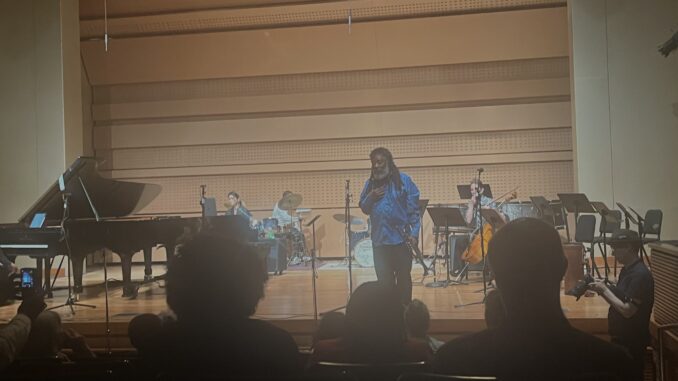
By Paulina Gajewski
“Creativity and artistic endeavors have a mission that goes far beyond just making music for the sake of music,” jazz musician Herbie Hancock once said. Centuries later, musicians like trumpeter and composer Wadada Leo Smith are constantly reinventing the ways in which music can touch the human soul. Smith premiered his new work “America Transformed” at the Leonard and Claire Tow Auditorium in Brooklyn College this past weekend from Sept. 8 to Sept. 11.
Smith, born in Mississippi, composed his first piece at the age of twelve, pulling from various southern musical traditions. His youth was imbued with music, as he received his musical education from his father Alex Wallace, who played the electric guitar in the Delta Blues Band. Smith also joined the band in subsequent years.
Smith’s discography focuses on the unity of social and cultural issues, and his techniques break age-old traditional forms of music. Most musicians use modern notation, which is characterized by five-lined staffs and music notes. The Chinese notation system uses numbers as opposed to rounded notes. Musicians who work with country tunes might opt for the Nashville number system, which centers around chords.
Smith, however, created his own method. Coined “Ankhrasmation,” the technique utilizes a combination of symbols, colors, and lines. His composed works of avante-garde jazz were constrained by typical notation, and his new system held a personal component. The musicians studying the piece determined what the notations meant to them, and then used that to fuel their performances.
Smith’s compositions often relate to issues that underlie a society. In 2013, Smith was a finalist for the Pulitzer Prize in Music for his work titled “Ten Freedom Summers,” in which he attempted to encapsulate the atmosphere surrounding the Civil Rights movements. Smith’s work “America’s National Parks” earned praise, and was inspired by not just the monumental legacy of landscapes, but the political controversies that paint the American landscape, as well.
Smith’s creative endeavors solidified his membership at the Association for the Advancement of Creative Musicians, which seeks to expand the definitions and techniques of the Western musical canon. Dena Beard, director of the Leonard and Claire Tow Center for the Performing Arts at BC, noted that this is the debut of a curated program that focuses on art in spaces of education.
Premiering over four days at Brooklyn College, “America Transformed” serves as a sequel to Smith’s work “Ten Freedom Summers.” His new work was written over a period of 37 years and aims to explore the figures who fought for the constitutional promise of freedom and equality for all.
The names of his pieces refer to such figures, including Muhammad Ali, Martin Luther King Jr., Thelonious Monk, and Lorraine Vivian Hansberry. Other names invoke the injustices and violence faced by Black Americans, including the four victims of the Sixteenth Street Baptist Church Bombing. Another piece was named after Emmett Till, a young African-American boy who was lynched in Mississippi. The remaining allude to the legal precedents set by the Thirteenth, Fourteenth, and Fifteenth Amendments.
The performances themselves reeled the audience members in with their abstract qualities. Two rhythmic pianos were punctuated by loud, powerful notes from Smith’s trumpet. At the beckoning of the drums, the pianos become frenzied and urgent. At certain moments, the pianists would pluck the strings inside of the grand pianos. The musicians would communicate with each other across the stage, whether they used hand motions or verbal commands.
Every element of these performances was accompanied by surges of emotions. Wadada Leo Smith’s techniques ensured that the audience was watching the creation of art on stage.
